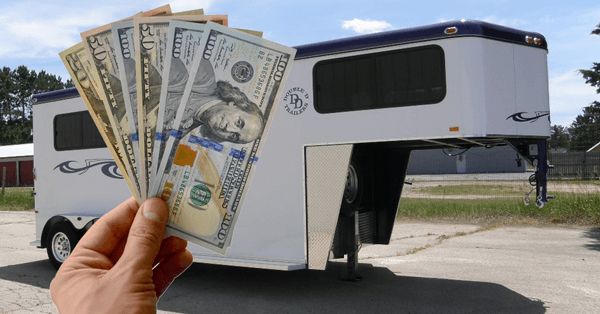What Do You Need to Get Approved for a Horse Trailer Loan?
Getting approved for a horse trailer loan today isn’t as easy as it once was. Since the 2008 financial crisis, banks have tightened their lending standards—especially for recreational purchases like horse trailers. Even buyers with high credit scores may face denials or unusually high interest rates.
But there’s good news: by understanding how lending works and preparing in advance, you can increase your chances of qualifying. Below are the most important steps you can take to improve your approval odds, based on real-world experience from Double D Trailers owner Brad Heath.
Want to learn more about the financing process? Check out our complete guide on how to finance a horse trailer for detailed lender info, payment examples, and more tips!

How Has Horse Trailer Financing Changed?
Then vs. Now:
-
Before 2008: Dealers like Brad could get buyers approved in under an hour with minimal paperwork.
-
Today: Buyers face higher scrutiny, more paperwork, and often need to work with third-party lenders or their own banks.
Lenders now see horse trailers as luxury or recreational items—not essential purchases. That means they treat them as higher-risk loans, similar to RVs or boats. Even with a FICO score over 750, applicants may be declined if other factors like documented income or debt-to-income ratio aren’t strong.
What Factors Do Lenders Look At?
Lenders evaluate several variables when approving a horse trailer loan:
| Factor | Why It Matters |
|---|---|
| Credit Score (675–730+) | Determines baseline eligibility and interest rate |
| Debt-to-Income Ratio (<40%) | Higher DTI = higher risk for lenders |
| Credit Card Debt | Affects your credit utilization and risk profile |
| Loan Amount & Trailer Age | Older trailers or high loan amounts may trigger concern |
| Income Documentation | Especially important for self-employed applicants |
| Past Loan History | Helps lenders assess payment reliability |
💡 Did You Know? These 6 Factors Can Make or Break Your Loan Approval!
Tip: If you're self-employed, lenders usually require two years of tax returns to verify income—even if your business is thriving.
Why Are Horse Trailer Interest Rates So High?
Horse trailer loans often carry much higher rates than home or auto loans:
| Loan Type | Average Interest Rate |
|---|---|
| Home Mortgage | ~6.5% |
| Auto Loan | ~4%–7% |
| Horse Trailer | 8.75%–18.95% |
Brad notes, “We’ve had to talk buyers out of financing because the interest rates were simply too high.” Longer terms (like 12 years) may lower monthly payments but increase total interest paid.
Common Pitfalls That Can Get You Denied
-
Unclaimed Income: True story... We worked with a buyer with a 703 credit score and strong earnings was declined because her side income wasn’t shown on tax returns. If you’re self-employed or earning rental/boarding income, banks typically require at least two years of tax returns as proof.
-
Co-signing on Other Loans: This adds to your debt-to-income ratio (DTI) even if you're not the one making the payments. It can easily push you over the 40% DTI threshold, which disqualifies many applicants.
-
Low Net Income for Business Owners: Lenders evaluate net taxable income — not gross revenue. Many small business owners write off expenses aggressively, leaving little "on paper" income to qualify
- Job History Gaps or Recent Changes (Even for W-2 Employees!): Most lenders require at least 12 months in the same job or consistent employment in the same field. One applicant that we worked with, a traveling nurse with years of experience, was denied because she had only been at her new (higher paying) employer for three months. Even though the field was the same, the short time at the new company triggered a rejection.
6 Smart Steps to Qualify for a Horse Trailer Loan
Here’s what you can do to prepare—and improve your approval odds:
1. Keep Loans Current
Ensure all debts are up to date with no missed payments in the past 12 months.
2. Boost Your Credit Score
A minimum FICO score of 675 is typically required. For better terms, aim for 730+.
3. Know Your Debt-to-Income Ratio (DTI)
Keep your DTI under 40% (including the new trailer loan).
Example:
-
Monthly income: $5,000
-
Monthly debt: $1,750 → DTI = 35%
-
Adding a $250 trailer payment brings DTI to 40%—still acceptable.
4. Avoid Co-Signing Loans
Even if someone else pays, co-signed loans count against your DTI.
5. Review Both Spouses' Credit
Applying jointly can help—but both credit histories must be solid. Otherwise, apply under the stronger spouse with sufficient income.
6. Document Self-Employed Income
Show two years of tax returns with enough net income to support the loan. Use business loans (in the company’s name) for business equipment whenever possible.
Final Tips from Brad Heath
-
Cash Helps: Today, about 75% of Double D Trailers buyers pay in cash. If you can make a down payment, it improves your approval odds.
-
Lender Flexibility: Double D Trailers works with several national banks and is happy to coordinate with your local bank.
-
Expect More Paperwork: Some trailer loan documents now exceed 20 pages.
Need Help with Financing?
Have questions or want to see if you qualify? Contact our team to review your specific situation—we’re here to help.
Or, click here to submit a financing application through our secure online form. All information is sent directly to our Wilmington, NC office and kept confidential.

